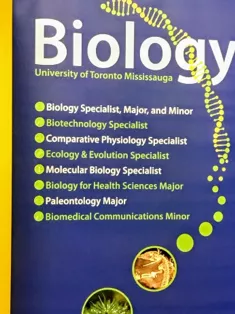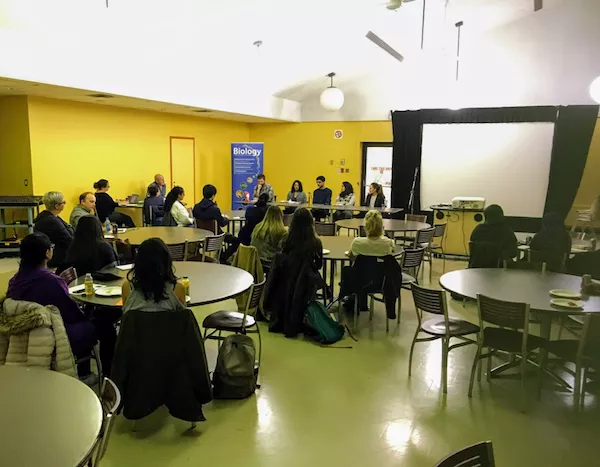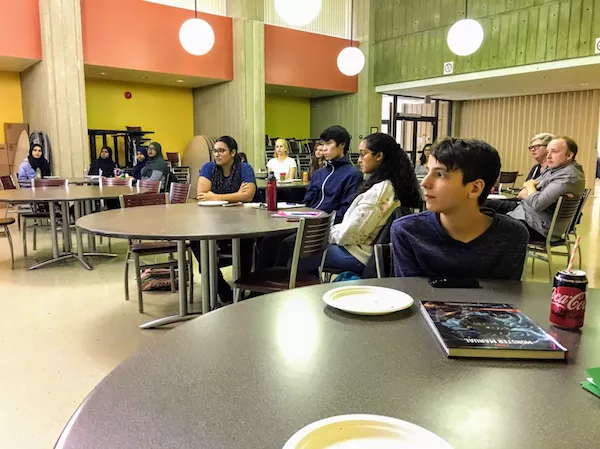
Undergraduate Students attend panel discussion about Graduate School
On November 14th, the Department of Biology held its first Graduate Student Q&A for undergraduate students. The event was designed specifically for students in the BioPath Professional Development Program as an opportunity to learn about real life pathways to Graduate School from current graduate students in the Department of Biology and the Master of Biotechnology Program. Five graduate students sat on the panel: Dr. Connor Fitzpatrick (PhD 2018, Marc Johnson lab, EEB), Urfa Arain (PhD, 4th year, Ted Erclik lab, CSB), Hind Boujaoude (MSc, 2nd year, Master of Biotechnology Program), Kayla Dias (MSc, Katharina Braeutigam lab, CSB) and Ahmad Hasan (PhD, 2nd year, Rob Ness lab, CSB). Each graduate student talked about their own path to graduate school and offered advice to the twenty or so undergraduates in attendance.
MC was Prof. Chatfield and Profs. Mark Dryer and Sanja Hinic-Frlog were at hand to also provide insights into possible paths.
Why did you choose to pursue your current post-graduate studies, and where do you hope it will take you (i.e. how will it help your career path goals?)?
What were the major requirements (or hurdles to overcome) to get accepted into the program?
What is the most fulfilling or enjoyable aspect or activity so far of your graduate studies?
What have you found to be the biggest challenge?

Ms. Hind Boujaoude (MSc, 2nd year, Master of Biotechnology Program) is currently completing a mandatory 8-month placement at Roche Canada. She is a study data manager organizing incoming data from current clinical trials. Her placement combines the science aspects she learned in her undergraduate degree with the business side. She spoke about how competitive is the Biotechnology master’s program as there is a lot of interest for the 42 spots available. The rigorous selection process involves an interview to assess interpersonal and communication skills as well as a written component where she had to summarize a scientific paper in an hour. She enjoys the team aspect of the program, working with other graduate students with diverse backgrounds.
Mr. Ahmed Hasan’s path to graduate school involved taking a year off to figure out what he really wanted to do. In his undergrad, he took a wide variety of courses, but it wasn’t until his fourth year when he landed a research project in Plant Microbiology, which piqued his interest about research. During his time off from his studies, he learned to code. Although his “mess of an undergraduate record” reflected in his grades, he was fortunate to have Prof. Rob Ness taking a chance on him and taking him on as a graduate student. Ahmed described graduate work as a marathon, not a sprint: “when failure happens and simple things can get you down, it is important to teach yourself to manage the failure”.
Ms. Urfa Arain’s plan was to go to medical school. She applied twice and didn’t get in. Luckily, in her fourth year she did a research project in a lab, leading her to discover that research was something she could do. She enrolled in a master’s program and transferred to her PhD. When she started her graduate program she was academia bound, but she is open to other opportunities. Urfa finds that the attending conferences is fulfilling as they provide opportunities to meet other researchers and travel the world. “A challenge in graduate school is accepting failure. Experiments will fail more than you’d want them to and it’s not as bad as it seems”. She still learns from things that don’t work.
Ms. Kayla Dias wasn’t sure what she wanted to do with/after her undergraduate degree. She thought she wanted to be a dentist. She job shadowed a dentist and realized she hated it. She also found pharmacy boring and hospitals depressing. Slowly, she eliminated all health care fields from her list of prospective careers. She finds that the most important thing she did was try out the field first. At the same time, she took some plant biology courses and found them fascinating. She got into a lab, and learned more in the year in a lab than her entire undergraduate career. One of the challenges to graduate school is the lack of a strict schedule, so staying on target is difficult.
Dr. Connor Fitzpatrick recently finished his PhD in the Johnson lab and graduated this month. He will be starting a postdoctoral fellowship in North Carolina in January. Connor was drawn to research from a young age, as he has older siblings who do research, and to him, the work seemed exotic. What draws him to science now, is working with creative and passionate people who push him to do better science. “Scientists think of what we don’t know and figure out how to know it”. He spoke frankly about the downside of doing a PhD, the personal sacrifices. Connor moved away from home to do his PhD and only gets home once a year. He has nieces and nephews he hasn’t even met yet!

Best way to get a supervisor?
Mr. Hasan said he met with a faculty member who gave a guest lecture that he found interesting. During the meeting he steered the conversation to find out if she had any lab openings. With the smaller upper year class sizes at UTM, Ms. Arain said students should not feel shy talking to the professors but to be aware that the faculty “will know when you are just talking to them for the sake of getting a position”.
After taking a few questions from the undergraduates, the panel visited students at their tables to have a more open conversation.
The Department of Biology wishes to thank our panelists and Prof. Chatfield for moderating the event. Stay tuned for a similar event in the spring, featuring Biology alumni.
